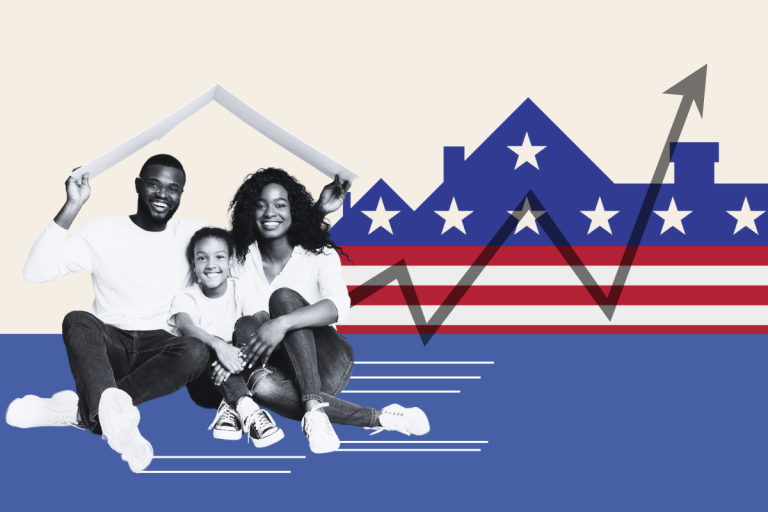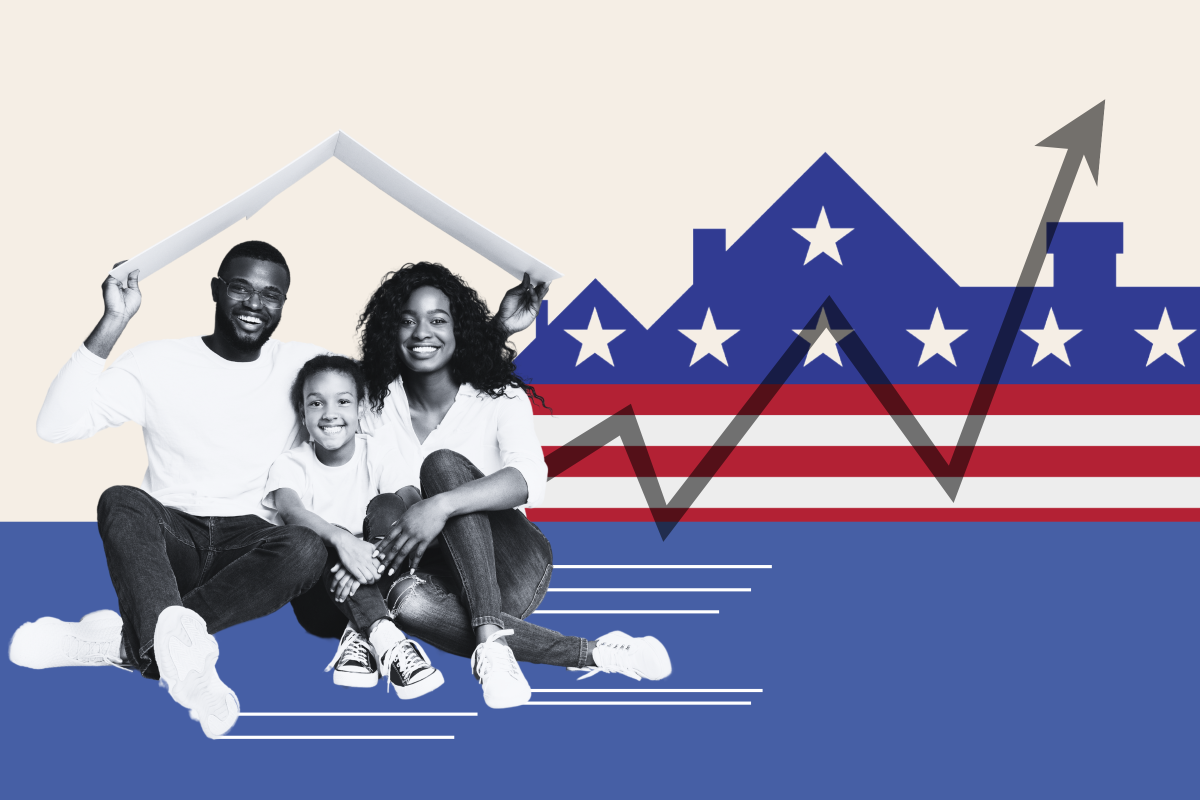
Homeownership among Black Americans, which saw a modest uptick in 2022 compared with the year before, is expected to soar in the future as a result of changing demographics, according to a report by the National Association of Realtors (NAR).
A new study published by NAR on Tuesday, which examined the homeownership rate by race and the experience of recent homebuyers in the real estate market, showed that the number of Black, Hispanic and Asian Americans owning a home continued growing despite fast-rising mortgage rates in 2022.
According to the report, titled ” A snapshot of race and home buying in America ,” the Black homeownership rate reached 44.1 percent in 2022, growing by 1.6 percentage points from 2012, while Hispanic homeownership reached 51.1 percent (up 5.4 points from 2012) and Asian homeownership 63.3 percent (up 6.1 points from 2012). The rate among white homeowners fell slightly, though it’s still the highest in the country at 72.3 percent (up 3.1 points from 2012).
This means that despite the progress in the past few years, the Black homeownership rate is still trailing behind all others, including by 28 percentage points compared with white homeowners. Newsweek illustration. Millennials, the largest generation in the U.S., should boost the rate of homeownership among Black Americans. However, the Black homeownership rate is expected to rise in the future, as Baby Boomers—those born between 1946 and 1964—leave their homes vacant and younger, more diverse generations take on the U.S. housing market.
Newsletter
The Bulletin
Your daily briefing of everything you need to know
By clicking on SIGN ME UP, you agree to Newsweek’s Terms of Use & Privacy Policy . You may unsubscribe at any time.
“Millennials and Generation Z are more racially and ethnically diverse,” Jessica Lautz, Deputy Chief Economist and Vice President of Research at NAR, told Newsweek . “While all first-time buyers are facing challenges in entering into homeownership, as more young buyers enter into the home buying market, there will be a rise in minority owners.”
Millennials have delayed the process of buying a home for years while they waited for better times to buy between the 2008-9 financial crisis and the pandemic, but they’re now flocking to the market, contributing to keep demand and prices up. As the largest generation in the U.S., Millennials are shifting the housing market in many ways—including making it more diverse.
According to the NAR report, 1.5 million Black households are expected to turn the median homebuying age over the next five years, as are 775,000 Asian households and 2.2 million Hispanic households.
A 2022 report by Realtor.com found that female and millennial buyers were driving growth in Black homeownership. Female buyers grew faster than their male counterparts each month, with an average year-over-year growth rate of 10.4 percent between October 2018 and September 2021. The average year-over-year growth rate of Black millennial buyers was 13.8 percent in the same period.
However, significant barriers to homeownership among Black Americans remain.
“The new research continues to show that Black potential home buyers are hurt more by rental affordability and student debt, which make saving for a downpayment difficult,” Lautz said.
“Additionally, there is a higher denial rate for mortgages for Black buyers.”
These are not the only hurdles they face.
“If a Black potential buyer does successfully save for a downpayment and is approved for a mortgage, they often have a limited pool of homes which they can afford to purchase based on their household income,” Lauz said. “Also, more than half of Black buyers are first-time buyers, which means they do not have housing equity to use for a downpayment.”
A March 2023 report by NAR highlighted the disproportionate burden of housing costs on Black Americans. It showed that 30 percent of Black homeowners are cost-burdened, meaning they spend more than 30 percent of their income on housing, a rate higher than that of Hispanic Americans (28 percent), Asian Americans (26 percent), and white Americans (21 percent).
The disparity extends to renters as well, with over half of Black renter households (54 percent) spending more than 30 percent of their income on rent, and about 30 percent of Black renters being severely cost-burdened, allocating more than 50 percent of their income to rent. This contrasts with 22 percent of white renters facing severe cost burdens.
According to the analysis, only 9 percent of Black renters can afford to buy the median-priced home nationwide, compared with 17 percent of white renters.
This means their ability to actually purchase homes and increase minority homeownership rates will ultimately depend on their ability to overcome challenges like affordability, access to mortgages and historically low housing inventory.
This post is curated. All content belongs to original poster at www.newsweek.com
Homeownership among Black Americans, which saw a modest uptick in 2022 compared with the year before, is expected to soar in the future as a result of changing demographics, according to a report by the National Association of Realtors (NAR).
A new study published by NAR on Tuesday, which examined the homeownership rate by race and the experience of recent homebuyers in the real estate market, showed that the number of Black, Hispanic and Asian Americans owning a home continued growing despite fast-rising mortgage rates in 2022.
According to the report, titled "A snapshot of race and home buying in America," the Black homeownership rate reached 44.1 percent in 2022, growing by 1.6 percentage points from 2012, while Hispanic homeownership reached 51.1 percent (up 5.4 points from 2012) and Asian homeownership 63.3 percent (up 6.1 points from 2012). The rate among white homeowners fell slightly, though it's still the highest in the country at 72.3 percent (up 3.1 points from 2012).
This means that despite the progress in the past few years, the Black homeownership rate is still trailing behind all others, including by 28 percentage points compared with white homeowners.

However, the Black homeownership rate is expected to rise in the future, as Baby Boomers—those born between 1946 and 1964—leave their homes vacant and younger, more diverse generations take on the U.S. housing market.
Newsletter
The Bulletin
Your daily briefing of everything you need to know
By clicking on SIGN ME UP, you agree to Newsweek's Terms of Use & Privacy Policy. You may unsubscribe at any time.
"Millennials and Generation Z are more racially and ethnically diverse," Jessica Lautz, Deputy Chief Economist and Vice President of Research at NAR, told Newsweek. "While all first-time buyers are facing challenges in entering into homeownership, as more young buyers enter into the home buying market, there will be a rise in minority owners."
Millennials have delayed the process of buying a home for years while they waited for better times to buy between the 2008-9 financial crisis and the pandemic, but they're now flocking to the market, contributing to keep demand and prices up. As the largest generation in the U.S., Millennials are shifting the housing market in many ways—including making it more diverse.
According to the NAR report, 1.5 million Black households are expected to turn the median homebuying age over the next five years, as are 775,000 Asian households and 2.2 million Hispanic households.
A 2022 report by Realtor.com found that female and millennial buyers were driving growth in Black homeownership. Female buyers grew faster than their male counterparts each month, with an average year-over-year growth rate of 10.4 percent between October 2018 and September 2021. The average year-over-year growth rate of Black millennial buyers was 13.8 percent in the same period.
However, significant barriers to homeownership among Black Americans remain.
"The new research continues to show that Black potential home buyers are hurt more by rental affordability and student debt, which make saving for a downpayment difficult," Lautz said.
"Additionally, there is a higher denial rate for mortgages for Black buyers."
These are not the only hurdles they face.
"If a Black potential buyer does successfully save for a downpayment and is approved for a mortgage, they often have a limited pool of homes which they can afford to purchase based on their household income," Lauz said. "Also, more than half of Black buyers are first-time buyers, which means they do not have housing equity to use for a downpayment."
A March 2023 report by NAR highlighted the disproportionate burden of housing costs on Black Americans. It showed that 30 percent of Black homeowners are cost-burdened, meaning they spend more than 30 percent of their income on housing, a rate higher than that of Hispanic Americans (28 percent), Asian Americans (26 percent), and white Americans (21 percent).
The disparity extends to renters as well, with over half of Black renter households (54 percent) spending more than 30 percent of their income on rent, and about 30 percent of Black renters being severely cost-burdened, allocating more than 50 percent of their income to rent. This contrasts with 22 percent of white renters facing severe cost burdens.
According to the analysis, only 9 percent of Black renters can afford to buy the median-priced home nationwide, compared with 17 percent of white renters.
This means their ability to actually purchase homes and increase minority homeownership rates will ultimately depend on their ability to overcome challenges like affordability, access to mortgages and historically low housing inventory.







